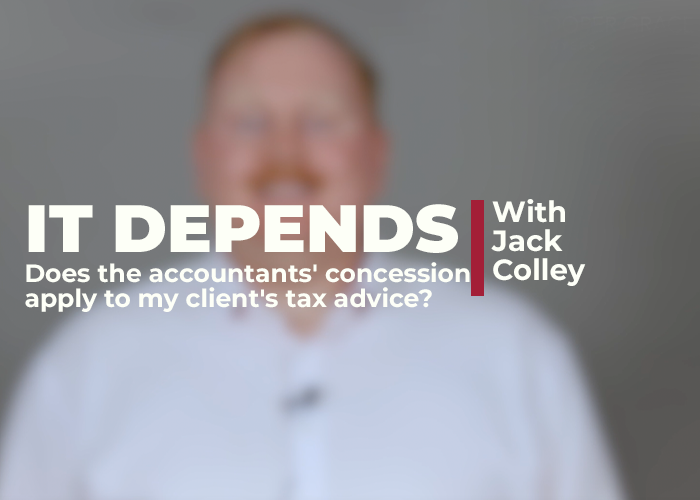Authored by: Justine Woods and Craig Turvey
Confidentiality applies to communications made to approved family counsellors, but there are exceptions to be aware of where a counsellor’s notes may be disclosed in a family law dispute. ...

In this edition of ‘It depends’, lawyer Jack Colley talks about the accountants’ concession. What is it, how is it different from legal professional privilege, and when will the ATO look to lift it?
Welcome to It depends. Today we’re going to be talking about the accountants’ concession. What is it? How is it different to legal professional privilege? And when will the ATO look to lift the accountants’ concession.
Many taxpayers seek advice from their accountants, ranging from straightforward questions when filing their tax return through to complex structuring and transactional advice. To recognise this trusted relationship and the confidential nature of the advice being given, the ATO grants an administrative concession known as the accountants’ concession. The accountants’ concession is a guideline put in place by the ATO for when they will seek to access a client’s non source documents, which is typically tax advice given by accountants and tax advisers. The ATO’s guidance on accessing non source documents says that the ATO will only seek to access these documents in exceptional circumstances.
The accountants’ concession is designed to provide a degree of confidentiality over client documents which can lead to it being confused with legal professional privilege or LPP. LPP will generally apply on advice given by lawyers to their clients. It is an enshrined feature of the common law, and there is a wide body of case law that determines the scope and application of LPP. By comparison, the accountants’ concession, while somewhat similar in application is an administrative concession made by the commissioner. If the ATO does make the decision that there are exceptional circumstances and decides to lift the accountants’ concession, there’s only an extremely limited right of review to review the ATO’s decision. The key takeaway is that the accountants’ concession does have limitations because of its nature as an administrative concession. It does not give rise to any legal rights like LPP does. That means there is space for the ATO to determine when the accountants’ concession will and will not apply. We have experience of our clients having the accountants’ concession lifted on tax advice prepared by their accountants.
The ATO will look to lift the accountants’ concession in exceptional circumstances, which may include where the ATO suspects fraud or evasion on behalf of the taxpayer source documents have been lost and the ATO has not been able to ascertain sufficient information to describe the tax consequences of a transaction, source documents have deficiencies or the taxpayer or their accountant refuses to provide the source documents and the taxpayer’s records cannot be located or they are located overseas and the tax payer does not provide access to them. This usually occurs as part of an audit or review process.
It depends. If your client is the subject of an audit or review, it may be worth reviewing prior advice to see if there is a risk to your client if the accountants’ concession is lifted. For a discussion regarding your or your client’s documentation, please contact a member of our team.
This publication is for information only and is not legal advice. You should obtain advice that is specific to your circumstances and not rely on this publication as legal advice. If there are any issues you would like us to advise you on arising from this publication, please let us know.
Subscribe to our interest lists to receive legal alerts, articles, event invitations and offers.
Cooper Grace Ward acknowledges and pays respect to the past, present and future Traditional Custodians and Elders of this nation and the continuation of cultural, spiritual and educational practices of Aboriginal and Torres Strait Islander peoples.
Fast, accurate and flexible entities including companies, self-managed superannuation funds and trusts.